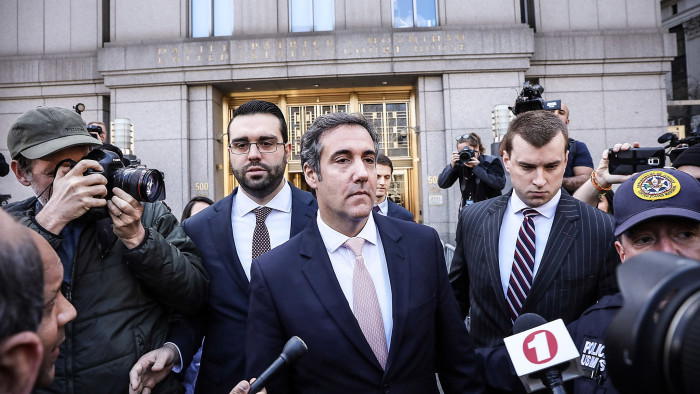Top lawyers caught in crossfire

Roula Khalaf, Editor of the FT, selects her favourite stories in this weekly newsletter.
The Novartis general counsel’s resignation in May over the hiring of Michael Cohen, President Donald Trump’s former personal lawyer, shows the growing status and complexity of the office of general counsel in big companies.
Felix Ehrat, top lawyer at the Swiss drugmaker since 2011, is considered an outstanding general counsel. He has been profiled in the Financial Times Innovative Lawyer series, along with his legal team. His departure, however, also demonstrates the challenges that can face a multinational’s chief lawyer. Mr Ehrat had jointly signed the letter that appointed Mr Cohen as a consultant, alongside Joe Jimenez, then chief executive. That was in February 2017, shortly after Mr Trump was elected, when many big businesses were reviewing their political consulting and lobbying strategies.
No one at that point knew that Mr Cohen’s company, Essential Consultants, had also paid Stormy Daniels, an adult movie actress who says she was paid to keep silent about an alleged affair with Mr Trump. Emerging revelations about her claims together with others relating to Mr Cohen caused a furore earlier this year, prompting several businesses to make public apologies for buying Mr Cohen’s services.
After just one meeting Novartis had already decided Mr Cohen could not deliver the promised services. However, it paid the lawyer out for his one year contract ($1.2m) as it could not terminate it without cause. Mr Ehrat’s resignation was his decision to draw a line under the matter and to assume political responsibility for the appointment.
Companies regularly use lobbyists and political consultants in Washington DC. Mr Cohen had also worked with Squire Patton Boggs, a US law firm known for its lobbying expertise.
The decision by companies to hire Mr Cohen followed normal procedures, but as many are discovering, doing business under the current US government is very different from previous administrations.
Another company addressing this US administration’s way of doing business is Veon, the communications and technology business.
With operations in Russia and the US and a big supplier’s contract with ZTE, the Chinese telecoms equipment company, Veon faced conflicting regulations and commercial imperatives when the US issued a denial order against ZTE in April. The order punished ZTE for violating US sanctions against Iran and North Korea. In its original form, the order was so broad that it would have prevented Veon engaging with ZTE at all. It presented difficult decisions for the company, which operates in 12 overseas markets. If Veon’s networks had gone down in, say, Ukraine, it would have had to bring in ZTE to fix them to comply with Ukrainian regulations, but that would have put it at odds with the US denial order.
The order was eased but the US Senate then voted to unwind the planned change, leaving the situation unclear. “Today’s geopolitics make the global legal environment increasingly difficult to navigate — there is an extraordinary level of unpredictability,” says Scott Dresser, Veon’s general counsel. “The recent enforcement action against ZTE is a prime example. Constantly shifting, and at times conflicting, legal requirements can create serious operational challenges as well as legal and political challenges.”
The usual recourse to ask external counsel for their advice is less reassuring than in the past. “We find ourselves working with external counsel differently. [They] are more of a sounding board, with the in-house lawyers making the difficult judgment calls.”
The effect is a potentially dramatic change in the role of the general counsel. As the profiles of general counsel in the FT General Counsel report show, the role is broadening to include other functions.
Protecting a company’s reputation in the current climate requires GCs to have a nose for public relations, but legal training generally emphasises the art of “no comment”. Some of the core disciplines they must now master are external affairs, communications and strategy.
The irony is that the frontline nature of the general counsel is causing some companies to ask if they even need a lawyer in the role. Optics — how things are presented — may become more important than legal expertise. Microsoft UK, for example, put Hugh Milward in charge of its legal function alongside corporate and external affairs. Mr Milward is not a lawyer but a communications professional.
Comments